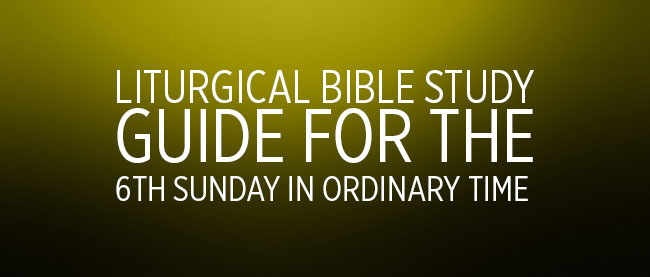1st Reading – Leviticus 13:1-2, 44-46
The book of Leviticus was written primarily for the priests of Israel, the Levites. It draws together various bodies of law and ritual, starting with the laws concerning the Levites themselves; and in fact this book becomes a manual for conducting the liturgy. Catholic exegetes admit the Mosaic authorship of this book, although they also allow that
later additions may have been made.
The book starts in the second year of the exodus, after the sin of the golden calf and the institution of the Levitical priesthood (Exodus 32:29). Moses knew that the use of sacrifices is something which is deeply rooted in the customs of many different peoples; possibly as a result of being descended from our common ancestors, Adam and Eve. What
is unique about the sacrifices of Leviticus is that blood sacrifices are required; something which had not been necessary prior to the golden calf. Now, when one wishes to approach God, in addition to whatever cereal sacrifices may be offered, a blood sacrifice is also required. Because the Israelites had violated the first commandment and worshiped a god in the form of an animal, animals must now be sacrificed to show that they reject these false gods and recognize God’s supremacy.
Along with the need for sacrifice came the concept of ritual uncleanness. Such uncleanness is a familiar concept in the East. (The “Untouchables” of India are an example). For the Hebrews, such ritual uncleanness seems to have had little to do with physical or moral uncleanness but was calculated to keep the People of God conscious of their election as a pure and undefiled people of spiritual qualities and destiny. The obedience and observance enjoined by the Law kept the people conscious of their obligations of purity of life and also made them have a greater awe for God and the religion requiring such purity of its worshipers. Ritual cleanness was demanded for almost any communion with God in the ceremonies of the Temple or the home. The leper was an object of much legislation as regards cleanness (Leviticus 13:14). It seems that the leper was thought to have been touched in a particularly direct way by the hand of God.
2nd Reading – 1 Corinthians 10:31-11:1
Saint Paul has been answering questions which the Corinthian Christians have posed to him concerning what is proper behavior and attitude. After all, they are among the minority in their town, they are surrounded by pagan believers and want to know what is permissible action. For example, is it allowed to eat meat which has been sacrificed to idols since they do not believe that the idols have any power? This is the question which we looked at last week. Today we hear Saint Paul sum up his teaching on Christian behavior.
Gospel – Mark 1:40-45
Last week we heard the close of Jesus’ ministry on the Sabbath in Capernaum. He had taught in the synagogue and cast a spirit out of a man there; he had then gone to Simon’s home and healed his mother-in-law; then, after sundown (the beginning of a new day in the Jewish reckoning of time) has healed many sick and possessed. The location of the healing which we hear about today is uncertain; all we know is that it takes some place in the region of Galilee.


